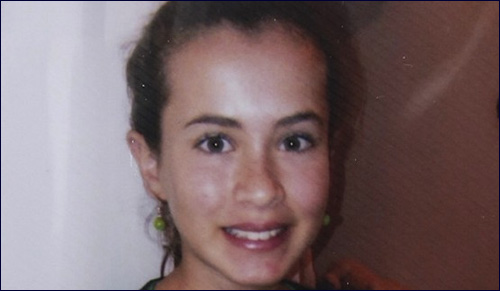 Vampire Weekend's Surprising Jewish Stories
Vampire Weekend's Surprising Jewish Stories


4 min read
3 min read
7 min read
4 min read
Don't let the media minimize her horrific death. Imagine if God forbid it was your child brutally killed.
Hallel Ariel was a beautiful girl. Thirteen years old, with a vibrant smile, athletic and graceful, she was just starting summer break. “Her whole future was open,” her mother explained.
The night of June 29, Hallel stayed up late to appear in an eagerly-awaited dance performance. The next morning she slept late. Hallel was peacefully asleep in her bed when an Arab terrorist scaled a security wall, climbed through Hallel's bedroom window and stabbed her over and over again.
One of my best friends was in the busy Jerusalem emergency room when Hallel’s lifeless body was rushed in. Everyone was crying, she recalled. As it became obvious that they could do nothing to save Hallel, Hallel’s mother, Rina Ariel, started to wail.
“It was like no other sound you’ve ever heard,” my friend explained, shaken to the core. “It sounded to me like a piece of her soul was being ripped out of her.”
As I read about Hallel’s murder, I couldn’t help but imagine if this God forbid happened to my own 13-year-old daughter. I was shaking in fear at the sheer unimaginable barbarity. Yet, for many Hallel’s death was being reported not as a human tragedy, but merely as the latest political development instead.
NBC News explained that Hallel lived in a “hardline Jewish settlement” (the town of Kiryat Arba, a few miles south of Jerusalem) - as if that excused, or at least explained, her murder.
Reuters shifted the attention away from Hallel entirely, focusing on her murderer instead, with a headline “Palestinian kills teen in Israeli settlement, then shot dead”. Many media outlets viewed the horrific murder as a minor footnote, barely deserving of mention in the news.
Some Palestinian news outlets lionized Hallel’s murderer outright. The Palestinian Authority’s official news agency referred to Hallel’s killer as a “martyr”. And a local Hebron news station quoted the murderer’s mother praising him effusively, gushing on air “my son is a hero. He made me proud… Allah willing, all of them will follow this path, all the youth of Palestine. Allah be praised.”
The New York Times bent over backwards trying to psychoanalyze the murderer. He “may have been trying to emulate a young woman from his hometown, or perhaps to avenge her death” after she was killed trying to kill Israeli Jews earlier, it theorized. The Chicago Tribune emphasized Hallel’s relation to Israeli Cabinet Member Uri Ariel (she was a distant cousin), and reported on his pro-settlement views, as if that somehow rationalized her frenzied murder.
In all the reporting on her death, Hallel was lost - reduced to a caricature, a symbol. A “settler”. An obstacle to peace. Someone whose life was disposable, whose death doesn’t impact us.
It is evil that creates a society that educates and instills a cult of death and idolizes murderers of innocent children. It is evil that drives a terrorist to enter Hallel Ariel’s house and stab her to death as she lies sleeping. As Rina Ariel said at her daughter's funeral, "I'm standing here with my hurting heart, and I'm turning to you, the Arab Muslim mother, who sent your son to stab. I taught my daughter to love. And you and teachers like you teach hatred. Go, take a look at yourselves. We are strong, we are here. The Eternal of Israel will not lie."
And it is evil for the media to look at a beautiful, vivacious teen and justify or explain, or somehow rationalize away and minimize her murder.
The antidote is to remember Hallel, not as a symbol, not as a political player, but as a glorious teen with everything to live for and to feel grief at her murder. To shudder at the evil that killed her. To allow her death to touch you as if it was God forbid your child brutally killed. At the very least we can hold onto our humanity in the face of such unmitigated evil.
